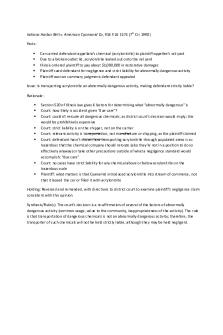Kamin v. American Express PDF

| Title | Kamin v. American Express |
|---|---|
| Course | Business Organizations I |
| Institution | Touro College |
| Pages | 2 |
| File Size | 70.8 KB |
| File Type | |
| Total Downloads | 26 |
| Total Views | 155 |
Summary
Case Brief and Notes for Business Organizations I...
Description
KAMIN v. AMERICAN EXPRESS COMPANY 86 Misc.2d 809, 383 N.Y.S.2d 807, affirmed, 54 A.D.2d 654, 387 N.Y.S.2d 993 (1st Dept. 1976) FACTS: Parties: Plaintiff: Kamin Defendant: American Express Procedural History:
Complaint brought against Δ
Δ motion for dismissal and alternately summary judgment
Relevant Facts:
Derivative action brought by minority shareholders to ask for a declaration that a certain dividend is a waste of corporate assets or a declaratory judgment for damages
1972 Δ acquired for investment 1,954,418 shares of DLJ for $29.9 million
The current market value of shares is $4 million
7/28/75 BOD of Δ declared special dividend to all stockholders of record pursuant to which the shares of DLJ would be distributed in kind
If the shares were sold on the market the company would suffer a taxable loss of $25 million which could offset gains elsewhere
Sale of the DLJ stock would save $8 million in taxes
ISSUE:
Whether a declaration of dividends which would waste corporate assets is a sustainable cause of action
PARTIES’ ARGUMENTS: Appellant: Appellee: DISPOSITION OF THE COURT:
Δ’s motions granted
RULE OF LAW:
The courts will not interfere unless the powers have been illegally or unconscientiously executed; or unless it be made to appear that the acts were fraudulent or collusive, and destructive of the rights of the stockholders. Mere errors of judgment are not sufficient as grounds for equity interference, for the powers of those entrusted with corporate management are largely discretionary
Courts will not interfere with such discretion unless it be first made to appear that the directors have acted or are about to act in bad faith and for a dishonest purpose
BCL §720(a)(1)(A) permits an action against directors for the neglect of, or failure to perform, or other violation of his duties in the management and disposition of corporate assets committed to his charge
HOLDING:
There is no showing of fraud or dishonesty and a decision that is merely disagreed with is not a basis for a cause of action
COURT’S REASONING:
Πs do not show more than mistaken judgment Director cannot be charged with ordinary negligence for having made an improper decision or having acted imprudently Neglect, referred to in BCL, is a neglect of duties and not misjudgment Whether to issue a dividend or not is a decision that a shareholder can disagree with when no fraud or dishonestly is alleged Δ had a BOD meeting where they expressly rejected Π’s contention citing countervailing concerns...
Similar Free PDFs

Kamin v. American Express
- 2 Pages

American express entrega
- 3 Pages

Young v. American Mini Theaters
- 2 Pages

Popped Secret-Educator express
- 10 Pages

Group 6 Nationwide Express
- 20 Pages
Popular Institutions
- Tinajero National High School - Annex
- Politeknik Caltex Riau
- Yokohama City University
- SGT University
- University of Al-Qadisiyah
- Divine Word College of Vigan
- Techniek College Rotterdam
- Universidade de Santiago
- Universiti Teknologi MARA Cawangan Johor Kampus Pasir Gudang
- Poltekkes Kemenkes Yogyakarta
- Baguio City National High School
- Colegio san marcos
- preparatoria uno
- Centro de Bachillerato Tecnológico Industrial y de Servicios No. 107
- Dalian Maritime University
- Quang Trung Secondary School
- Colegio Tecnológico en Informática
- Corporación Regional de Educación Superior
- Grupo CEDVA
- Dar Al Uloom University
- Centro de Estudios Preuniversitarios de la Universidad Nacional de Ingeniería
- 上智大学
- Aakash International School, Nuna Majara
- San Felipe Neri Catholic School
- Kang Chiao International School - New Taipei City
- Misamis Occidental National High School
- Institución Educativa Escuela Normal Juan Ladrilleros
- Kolehiyo ng Pantukan
- Batanes State College
- Instituto Continental
- Sekolah Menengah Kejuruan Kesehatan Kaltara (Tarakan)
- Colegio de La Inmaculada Concepcion - Cebu










